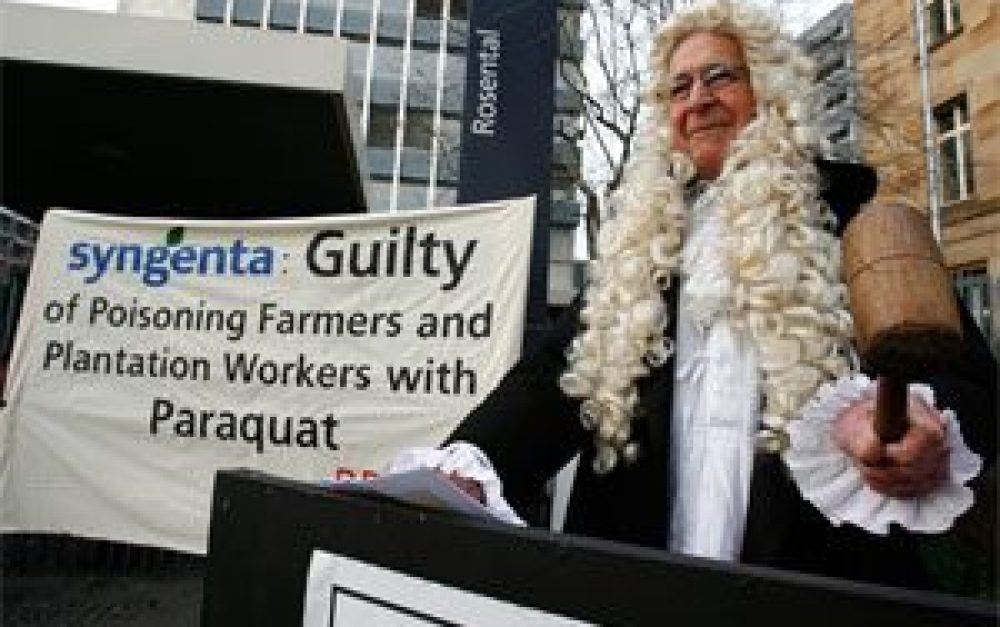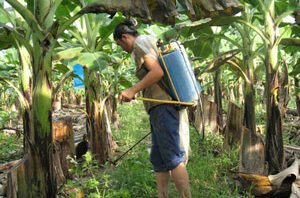Earlier this month in Rome, the deadly pesticide paraquat moved a step closer to global phaseout. Paraquat is widely known in the developing world as the poison of choice for farmer suicides, and was notorious in the 1970s as the herbicide sprayed by the U.S. government to try to eradicate marijuana plots in Mexico.
The event didn’t make much news, but it is good news. It’s part of a slow-moving, wonky process of agreeing on a watch list that warns countries against trade in hazardous chemicals — the Rotterdam Convention on Prior Informed Consent (PIC). A final decision won’t be taken until 2013. But key players were paying lots of attention in Rome.
I attended the March 28 – April 1 meeting of the PIC Chemical Review Committee because since 1982 when PAN first conceived of a treaty like this, prior informed consent has been one of our strategic aims. PAN foresaw that a global agreement could provide the right to know about the "circle of poison" — pesticides spreading around the planet — and give governments the right to refuse them. With notice that some countries are banning or severely restricting a listed chemical, many others soon take similar actions.
The pesticide industry is not a fan, and so they were in Rome too. As Keith Tyrell, Director of PAN UK commented, the paraquat recommendation “was fought tooth and nail by Swiss chemical giant Syngenta — which has a more than three quarters market share of paraquat sales. It has lobbied hard to keep the pesticide out of the treaty, and is likely to continue to do so in the coming months.”
As Tyrell wrote for The Ecologist this week:
Paraquat is one of the deadliest pesticides available in the world today. It is responsible for a huge proportion of the more than 250,000 deaths that occur from pesticide poisoning every year. The vast majority of these deaths are suicides. Paraquat is chosen precisely because it is so deadly and because – above a certain concentration – there is no effective antidote. As little as a mouthful of 20 per cent solution paraquat is likely to cause death.
Burkina Faso made the proposal to list products containing at least 20% paraquat. Gramoxone Super (one of Syngenta’s leading brands of paraquat formulation), would make the list. The Convention requires that listing begins when any country that has ratified the PIC treaty proposes a product it has banned or severely restricted. Burkino Faso cited many poisoning incidents involving farmers who can’t read label instructions and, as is common across the developing world, have little or no personal protective equipment. Many countries (though not the U.S.) and the European Union have already banned paraquat because of its health dangers even when used according to directions, beyond suicides and accidents, and more will follow if it is listed under Rotterdam.
Industry is stalling, but momentum is on our side
Chemical industry objections are predictable because the PIC treaty, along with the POPs treaty (Stockholm Convention), is moving slowly but surely toward reducing worldwide use of the most hazardous pesticides. Every year like clockwork, industry reps attend these meetings to exploit regulatory loopholes and create delays to squeeze a more years or even decades of sales, despite the carnage that will occur while they lobby.
Nine representatives of CropLife, the pesticide trade association, were present and speaking for Syngenta. CropLife questioned the symptoms and severity of paraquat poisoning reported by Burkina Faso, and said the evidence suggested that individual reports were misclassifications. The Berne Declaration, a Swiss advocacy group and long-time PAN partner, responded that the paraquat poisonings in Burkina Faso are consistent with symptoms described in the scientific literature.
India, which has a burgeoning off-patent pesticide industry, has been distinguishing itself as the defender of the chemical industry at meetings of both the Rotterdam and Stockholm Conventions (the POPs treaty), and it supported Syngenta’s objections. The Indian Chemical Council tried to argue that since Burkina Faso had banned paraquat in 2006, recent poisonings represented illegal pesticide use and so the PIC Review Committee couldn't consider such evidence. The chair countered that one of the goals of the Rotterdam Convention was precisely to prevent trade in illegal pesticides.
Nonetheless, India and Syngenta will likely be back objecting to listing paraquat when the full Conference of the Parties convenes in 2013 to deliberate the fate of paraquat and other chemicals. PAN and our partners will be there too. And momentum is on our side.
Chela Vasquez is a Campaign Coordinator with PAN North America, currently working from the PAN Asia and the Pacific office in Panang, Malaysia.







